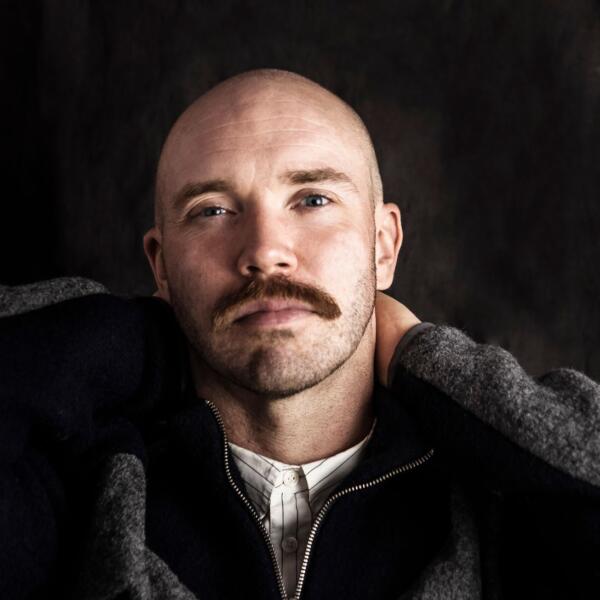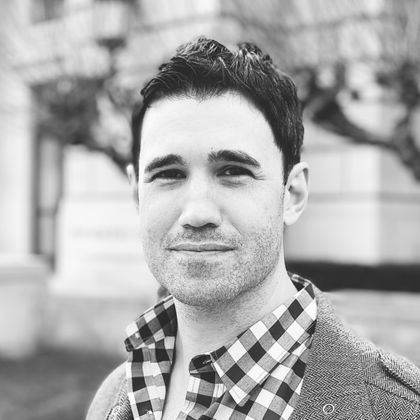Like gold. Like an almost infinite number, the water and the walls, how
rare, unknown pieces would fit. We wrote what seems like forever:
love poems, letters, petitions, small ads
Do not stop
like singular pairs of hands that tried to link water
– We did not want to come up with something –
The coastline where we have always been standing
The erosion beneath us tickled, we fell and held and fell
and held. I wake up sometimes with craving in mind,
whiplash cravings, contrary-craving, life-is-long-craving
Craving. Promises stored. Sandbanks move. Overcrowded
and overridden. These places, international airports, make me
always so soft and sensitive. I pretend not to notice. I listen to wind
in sun-drenched rosebushes
– Talk about it as slowly as possible –
Sudden body. Lingering wind. Barters away. It blows within my
body. My homosexual body goes to pieces
Spring sun penetrates the snow as we cycle across the yard.
Knee-deep in snow melt, I bend down over the fresh seabed.
Down on my knees. On my back. Water blankets the body
except for nose and mouth anchored at the surface. Sharp movements
and I swallow water, then coughing, take in still more.
In the moment of death, I imagine K. He becomes
totally real and holds my swollen water-logged hand in his
So I tried to express something that made a strong impression. Like
with K a few times after the first time, invasion, rain, sickly
lost little bird against the box, shut tight and we lay quite still
halfway penetrating. An idea illustrated by loose objects
Sweater, ticket, receipt, food, lube
It must have been
even in nudity, a snorting devotion, written down.
The persistent notion about the ass as the inverted cry
from the man’s sex
A completely contemporary image shows K with arms around my shoulders in
a pub. He never drinks alcohol.
The nourishment extracted from fruitful conversation takes detours and
we are forced into a waterproof rhetoric whose only obstacles are allowed to be
the victim’s total inability to act. This bluntness is a
hallmark. Slightly worn with caution, fine. The words, and the
missing words, sneak into the century. Appealingly. Like falling on
knees. Hands are like stars when pressed against the floor, slipping
out farther and farther to torture’s shredded border with
the cuticles. We’re traveling to where the tulips are growing. Weep and
ache. Deflower him, perforate him. That’s all he
has ever dreamed of
As the vessel. Sealed, muddied. I follow him. Heel stone heel stone
at different intervals. He looks over his shoulder, tip-toes,
Clickclack
His acceleration barely noticeable. Spikes. Heel.
Back claw-covered. Afterwards. He will thank me afterwards
I follow him through the night club’s panting projections
up to the wall where he beats his head against the surface: I love you,
I love you. Glass, cement, spikes, brick: anything that leaves a mark.
It may look different. But still accurate. This is the exact choreography
that twins me and K. It led you to smile in the sun, K.
I won’t even begin to tell you about the darkness in the parks
The center, he says, journeying into snow. Time passes. Measured longing
afterwards. I remain at the hall’s exaggeratedly broad, fiercely bright
window and suddenly have the opportunity to correct every single thing,
each of the tablecloth’s corners, every cuff while flakes
slowly sail off. Closes his eyes. His journey away, in white,
flickering. A colossal natural light and the room flows with
sounds. What was it he said? That guilt drips, that shame sucks?
Like the teat he was so attached to. Turning himself
for easier access. Making himself quite affectionate. Tame. To get a sip.
Did I stroke his back afterwards? Afterwards we saw everything with new
eyes. What had we been waiting for, lit by completely unfamiliar
people at night?
I need pictures of them. Necks of different guys. And
notes. The graphite-grey ones blanketing what we’ve been waiting
for. More than a sky. More than a sky over a certain
written history or the two of us. Now I have to go
Guys creep in the sand forever on the hunt. Like
sweet dogs. Or radiance. Or hopes. Bite him
from behind. Move around or try to leave a mark on the shoulder. Or
further down. His lower back and ass will be branded, tagged
for his own sake
After each other. About each other. The embrace. The step forward.
Polarization is a lucid first strategy in order to seize
understanding. They are so cold and far from intimacy. I
need them to whisper, to exchange smiles, to be enveloped
in one another in a way that confirms the dream of symbiosis and
harmonized extinction. I can’t handle anything else today. Other than
the fine white cotton t-shirts along the sand and water. As if
water suggests emotion and words for emotions convey objectivity. I
love: your slippery way. Your greasy textiles
I tell everything to K and J and L and M. I sit like
a Greek god, half-undressed and in really good shape, on the back
of the couch and when I pronounce certain words
Loose words: true, field of vision, nausea
Telling the story excites me.
True but unmistakable: arm hairs perk in unfamiliar
color combinations. To tear from edge to edge. New fresh
flesh wounds on my contaminated arms. Politicized healing power, my
boyfriend’s gaze, my very good friend’s gaze. Successful
community trials. Chest tightness

Kristofer Folkhammar is a Swedish poet, novelist, and literary critic, based in Malmö. Apart from several publications in Swedish literary journals, he has published two collections of poetry: When He Kissed Me, I Lost Everything (När han kysste mig förlorade jag allt), 2012, a collection of prose poems that consider gay desire, loneliness, and forms of intimacy. And In Time, Tonight (I takt, inatt), 2020, a minimalistic and rhythmically composed collection that deals with fellowship and submission, sickness and lust. He is also the author of the novels Isak & Billy (2011), Magisterlekarna

Christian Gullette’s poems and translations have appeared or are forthcoming in the American Poetry Review, Yale Review, Kenyon Review, New England Review, Colorado Review and other journals. He received his Ph.D. in Scandinavian Languages and Literatures from the University of California, Berkeley, and he serves as the editor-in-chief of The Cortland Review.